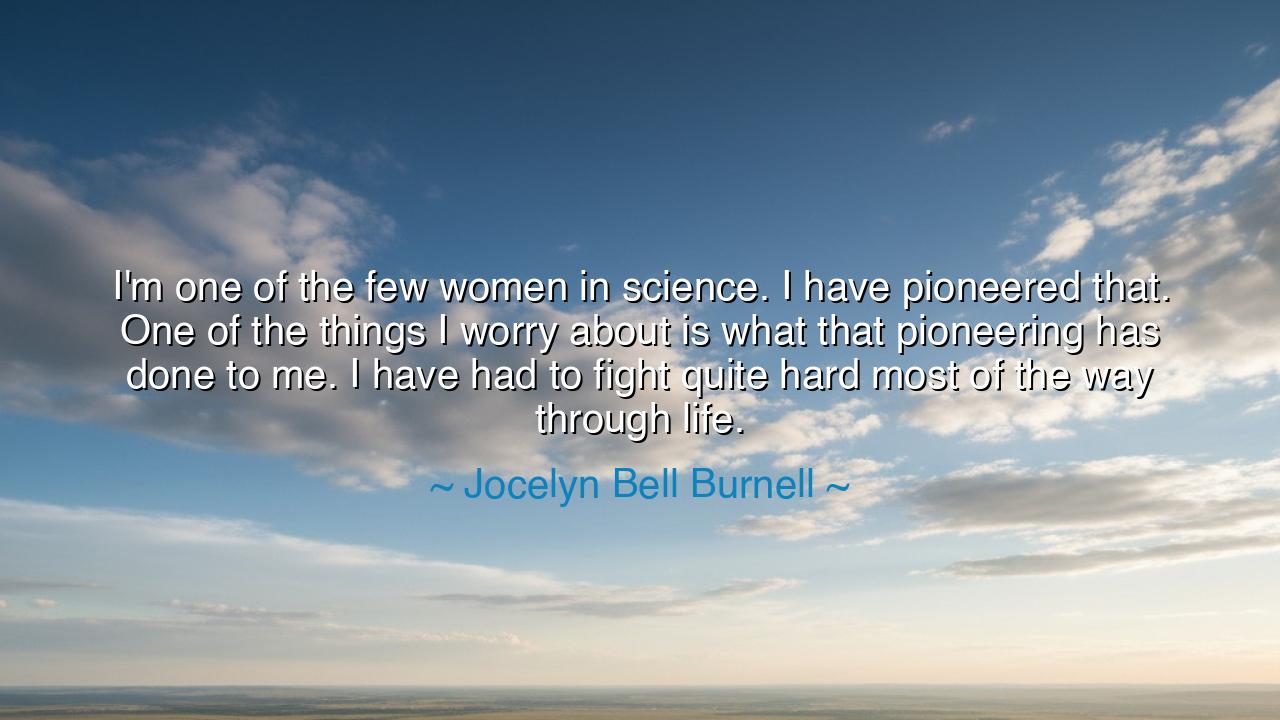
I'm one of the few women in science. I have pioneered that. One
I'm one of the few women in science. I have pioneered that. One of the things I worry about is what that pioneering has done to me. I have had to fight quite hard most of the way through life.






Hear now, O seekers of wisdom, the words of Jocelyn Bell Burnell, a woman who rose to greatness in a field long dominated by men: "I'm one of the few women in science. I have pioneered that. One of the things I worry about is what that pioneering has done to me. I have had to fight quite hard most of the way through life." These words carry the weight of experience, the struggles of a life lived on the edge of progress, and the quiet wisdom of a woman who has both triumphed and been scarred by her place in history. In her voice, we hear not only the echo of her own journey but also the deep, unspoken truth of what it means to fight against the currents of an unjust world.
The very nature of science has, for centuries, been entwined with the hands of men. Galileo, Newton, Darwin—these are the names that echo through the halls of history, the titans whose discoveries shaped the course of human knowledge. Yet, there were others, quiet and often overlooked, whose brilliance was equally as profound but whose voices were stifled by the constraints of their time. The world of science—just as with the realms of art and philosophy—has often been a place where women were not welcomed, where their voices were silenced, their contributions ignored. Bell Burnell stands as one of the brave few who dared to pioneer in this realm, to demand her place among the giants of knowledge.
In the words of Bell Burnell, there is a deep reflection on the cost of pioneering. To break new ground, to stand in the place where others have not dared to stand, is not only an act of courage and strength, but one that demands great sacrifice. Bell Burnell speaks of the fight she has had to endure, a fight not just against the prejudices of the world but against the very forces of society that sought to keep her in her place. It is a fight that every trailblazer knows too well. Just as the great philosophers of ancient times, such as Socrates, faced the condemnation of their peers for challenging the norms of their society, so too did Bell Burnell face the resistance of a world that was not ready to embrace the brilliance of a woman in science.
Consider, O wise ones, the tale of Marie Curie, whose discoveries in radiation and radioactivity not only led to the advancement of science but also laid the groundwork for the future of medicine and physics. Curie’s work was revolutionary, yet she, too, faced the barriers of gender and society. Her Nobel Prizes were earned not only through genius but through immense struggle, for she was not allowed to present her work at prestigious conferences, nor was her success met with the same admiration that might have been afforded to her male counterparts. Yet, like Bell Burnell, she persisted, and in doing so, she became a pioneer who changed the course of history.
What Bell Burnell reminds us in her reflection is the true cost of pioneering in a world that refuses to acknowledge your place. For every achievement, there is a struggle. For every door that opens, a battle must be fought. Bell Burnell speaks not only of the victories of her life but of the personal cost—the emotional toll, the loneliness, the constant need to prove herself worthy. It is a cost that all pioneers must bear, for they are not only breaking new ground in their field but also in the hearts of those who cannot yet see the value of their work.
The lesson here, O seekers of wisdom, is one of resilience and perseverance. To pioneer is to walk a path that is not yet cleared, to step into the unknown where others fear to tread. Yet, in doing so, we become the architects of the future. Just as Bell Burnell did in science, so too must we in all aspects of life. Whether in education, art, or any pursuit that stirs the soul, the act of creating new pathways is not one for the faint of heart. It requires strength, courage, and, above all, the willingness to endure the struggles that come with standing in the place of truth and discovery.
As we look to the future, let us remember the pioneers—Bell Burnell, Curie, and countless others—who walked before us, whose struggles paved the way for the triumphs that we now take for granted. Let us also remember that the cost of pioneering is often great, but the rewards are even greater. And in our own lives, as we seek to break free from the chains that hold us back—whether they be societal expectations, personal fears, or the weight of past failures—let us carry the torch of those who have come before us. Let us be inspired by their strength, their resolve, and their vision to create a world where all are free to follow the path of their own dreams, unburdened by the prejudices of the past.






AAdministratorAdministrator
Welcome, honored guests. Please leave a comment, we will respond soon